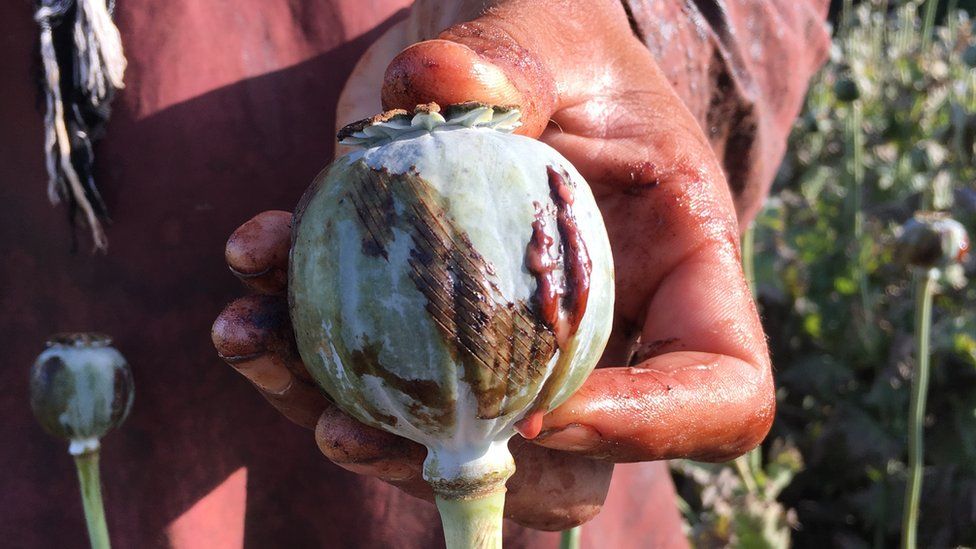The opium farmers with the police on their side
- Published

This year, Afghanistan is expected to produce more opium than the world consumes. Although billions of dollars have been spent trying to eradicate the crop, in some places the trade seems more institutionalised than ever, with local police openly supporting farmers.
Mazar-e-Sharif is one of the safest and best-run cities in the Afghanistan - a model of good governance - yet just half an hour out of town in a small village of mud-walled houses it is obvious what the main cash crop is.
I stop at a big poppy field right beside the road. It must be 100m square. Thousands of swollen poppy heads nod gently at me in the dawn breeze.
Across the field, five or six men are working, scraping the bulbs with a sickle-shaped tool. They look up, but they don't seem concerned.
The villager who is guiding me gestures to indicate I can go into the field.
The plants are waist high and brush against me as I walk. The heads are bigger than I expected, about the size of a large plum. Most have a blackish purple dribble on the side.
Each afternoon the workers score the bulbs with a series of tiny scratches. Overnight the sap suppurates out to form a dark scab.
It is hard to believe this is the source of so much misery and conflict in the world.
For a moment I'm back in a history class in my school in north London, rain lashing down on the windows, learning about the opium wars. I remember people I knew from that time who became addicted to heroin. Two are dead now.
I touch the opium with my finger. I expect it to be sticky, but it is actually surprisingly moist. The reddish black colour is a thin skin. Underneath, it is white and the texture of pus.
I sniff it. It barely smells at all - perhaps a hint of grass cuttings or crushed leaves - but in this form, the legendary intoxicant is almost odourless.
I rub it between my fingers. It darkens and becomes more gummy.
Curiosity overcomes me. I raise my finger to my mouth and dab my tongue, just for a moment. It tastes horrible, bitter and metallic.
I am startled by a shout. One of the harvesters, his salwar kameez brown with opium stains, has been watching me. He saw me taste the drug.
"Don't do that. That stuff is very bad for you," he says.
"Haven't you ever been tempted to try it?" I want to know.
"I know that if I start using it, I'll get addicted and my future will be destroyed. The people who use it - I've seen them in the cities lying down, their family life is destroyed, their children don't go to school," he tells me.
"But you're helping produce the stuff. Don't you feel guilty?" I ask.
I'm not surprised by his answer. "I've got no choice," he says. "I've got no job and you get good money with the opium."
Find out more
- From Our Own Correspondent has insight and analysis from BBC journalists, correspondents and writers from around the world
- Listen on iPlayer, get the podcast or listen on the BBC World Service or on BBC Radio 4 on Thursdays at 11:00 and Saturdays at 11:30
My colleague Mahfouz, who's been translating, tells me the farmer has arrived and that we should meet him.
Taza Meer greets me cheerfully, but as we shake hands I notice with a shock that the man beside him has an AK47 slung over his shoulder.
Meer sees I am alarmed. "Don't worry about him," he says. "He's a policeman."
The man smiles warmly and reaches out his hand.
Growing opium is a very serious crime in Afghanistan. You can be punished with death, yet here is a policeman welcoming a BBC reporter to a poppy field at the height of the harvest.
We chat for a while, then Meer offers us tea. He leads me along a path beside a small irrigation stream. The policeman follows behind.
I see almond, peach, walnut and plum trees.
"Your farm is very fertile," I say. He agrees, telling me he also grows wheat, cotton and melons. Yet, over a steaming cup of saffron tea, he claims he has no choice but to grow opium.
"I get three times the profit and I need the money. There are 12 people in my family," he says.
"Doesn't the government try to stop you?" I ask. "They must know what you are doing." I nod toward the policeman, who has joined us for tea.
"Of course they know," he says. "But they also know it is the only way anyone can make decent money They help us, and we help them."
He puts a hand on the policeman's knee.
"He is a local man like me," the farmer says. "The police treat us well, they understand the pressures on us. We all get along fine."
The policeman nods his agreement and takes a sip of saffron tea.
The sun shines in through the open window, and both men smile at me.
They clearly think the enterprise they are involved in is the most natural thing in the world.
Subscribe to the BBC News Magazine's email newsletter to get articles sent to your inbox